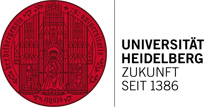EXIST-Funding for young researchers
Five teams of young researchers at Heidelberg University and Heidelberg University Hospital have succeeded in their bids for funding from the EXIST Transfer of Research programme. The goal is to found start-ups for developing new technical and medical products on the basis of research results. The Federal Ministry for Economic Affairs and Energy (BMWi) approved funding in the amount of more than three million euros for this purpose. Support is awarded to potential start-ups pursuing outstanding albeit expensive and risky development research.
Associate professor Dr Christoph Garbe of the Heidelberg Collaboratory for Image Processing (HCI) at Heidelberg University receives funding for a project, which is focused on the development of a production prototype for a light-field-based 3D scanner. This innovative technology, which can be used to model any object in previously unmatched quality, is aimed in particular at opening up the field of three-dimensional media design.
Dr Denis Pöhler of Heidelberg University's Institute of Environmental Physics plans on commercialising a new type of mobile instrument for measuring nitrogen monoxide and nitrogen dioxide in the air. Areas of application range from high-end research, environmental observation, vehicle emissions measurement and air quality monitoring to deployment in industry and medicine.
Dr Rongxi Yang at the Women’s Clinic of Heidelberg University Hospital is the leader of a project, which aims at developing a highly reliable and precise diagnostic test for the detection of breast cancer at very early stage. This will be a cost-efficient and simple screening method that only requires a few drops of blood.
Dr Oliver Heinze at the Center for Information Technology and Medical Engineering of the Heidelberg University Hospital is developing new secure technologies for citizens to keep control of their health and medical data in terms of access and exchange. In particular chronically ill people will have new possibilities to optimise their health management using apps.
Dr Silvia Pantze and Dr Frieder Helm of the Institute of Pharmacy and Molecular Biotechnology want to continue the development of an innovative manufacturing process for certain active agents that can be administered orally in place of painful injections. These are peptide and protein agents that might be used to treat diabetes and growth disturbances or even cancer –at this point, they can be processed to have the shape and consistency of a ‘gummy bear’.
Start-up Management of Ruperto Carola, Technology Transfer Heidelberg GmbH of the University Hospital and Heidelberg Startup Partners assisted the teams with the proposal and application process. „Start-ups born out of research make an important contribution to a society that reaps the benefits of the innovative power of research,“ says Dr Sigurd Weinreich, Head of the Research Division of Heidelberg University.
The EXIST Transfer of Research programme has two phases of funding. In the first phase that lasts up to eighteen months, the results of research that have the potential of becoming the basis of a start-up business are developed further. The objective is to convert research findings into technical products and processes, to develop a business plan based on the business idea and to plan the start-up business. Subsequently a second funding period of another eighteen months for further development work can be applied for. In that phase the focus is on measures to start business operations as well as meeting the prerequisites for external business financing. EXIST Transfer of Research is co-financed by the European Social Fund.

